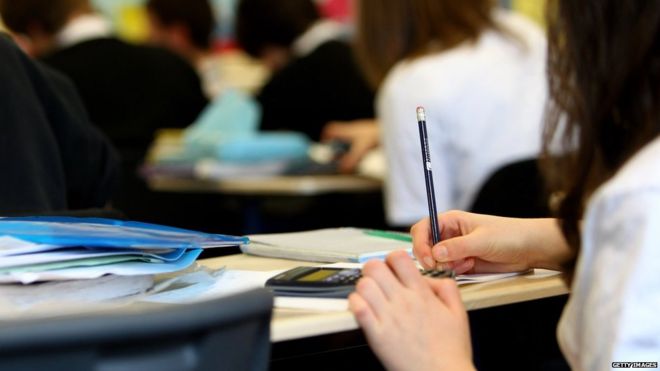
There are only six areas in England where parents want new grammar schools and creating them would benefit the wider school population, a study says.
The Education Policy Institute modelled the impact of government plans to expand selective schools by looking at how 32,844 districts would be affected.
The think tank applied the government’s conditions for allowing new schools.
The government called the study a crude attempt to second-guess the results of its consultation on new schools.
The researchers began by constructing a set of tests mirroring the conditions for new grammars set out in the government’s White Paper, Schools that Work for Everyone.
These were that they:
- should not be to the detriment of pupils who miss out
- need to be in areas where there are sufficient numbers of pupils who could attend
- should not undermine existing high-performing schools
- are only in areas where parents want them
They found that broader education levels would be harmed if new selective schools were created in areas where more than half of highly attaining pupils could access grammar school places.
This “no detriment” principle knocked out just under 30% of areas.
They then excluded any area that did not have at least 150 pupils with high prior attainment who lived within a reasonable travelling distance.
This disqualified a further 1% of areas.
The researchers then excluded areas which already had high-performing non-selective schools, whose fortunes could be harmed by the introduction of new grammar schools.
This left just under a fifth of areas.
When these areas were cross-referenced with the 37 local authority areas which expressed strong support for new grammars in a recent YouGov poll, just six areas remained.
These were Solihull, Essex, North Yorkshire, Dorset, Northamptonshire and North Somerset, all of which have fewer disadvantaged pupils than the national average.
The study added that expansion principles would be met only in parts of each local authority area.
“We therefore conclude that it will be difficult for the government to identify areas for grammar school expansion that will avoid damage to pupils who do not access the new selective places, where there is public demand for new selective places and high disadvantage,” the researchers said.
‘Complete mess’
The EPI’s chairman, David Laws, said his organisation’s analysis showed that the provision of additional grammar school places in England would be unlikely to be an effective strategy to boost social mobility.
“The additional analysis that we have now published highlights further significant challenges which face the government if ministers decide to press on with these proposals.”
Labour’s shadow education secretary, Angela Rayner, said the report “joins the mountains of evidence that proves a return to grammar schools will not improve education for all, but will actively make things worse”.
Ms Rayner said the grammar proposals were “a distraction” to cover up problems created over the past six years: “a teacher shortage crisis, thousands of children in super-sized classes, school budget cuts and not enough good school places”.
The National Union of Teachers called the plans “a complete mess”.
“It is simply not possible to improve educational outcomes for disadvantaged pupils while also increasing the number of selective schools,” said NUT general secretary Kevin Courtney.
The Association of School and College Leaders also believes that expanding grammars will damage rather than improve poor children’s prospects.
“The attainment gap between poor children and other pupils is one of the biggest challenges we face in the education system, but more selection is simply not the solution,” said ASCL’s interim general secretary, Malcolm Trobe.
And in a letter to Education Secretary Justine Greening, 33 head teachers from Kent call for the county’s selective education system to be abandoned.
The heads, all from non-selective schools, say selection “serves to erode self-confidence, to limit aspirations and develop a culture of ‘second best’ that good leaders in non-selective schools then spend time undoing so that they can unlock the students’ true potential”.
Kent has one of the widest gaps between the achievement of disadvantaged and non-disadvantaged students, say the heads.
“The very existence of a two-tier selective system is the biggest cause of this inequality,” they add.
‘Transformative impact’
But a spokeswoman for the DfE dismissed the findings, noting that its own consultation on removing the ban from grammar schools closes on Monday.
She said: “This report is a crude attempt to second-guess what that consultation will conclude.
“Independent organisations have recognised the transformative impact grammar schools can have on the lives of disadvantaged young people.
“Our consultation closes on 12 December and we look forward to considering all the responses.”
[Source:- BBC]








